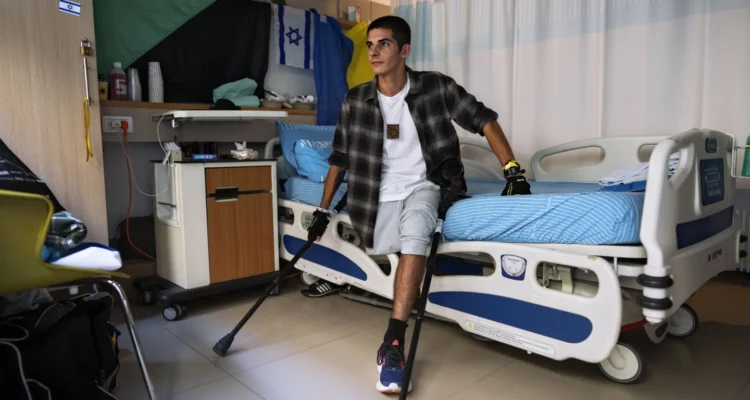As of September, more than 10,000 wounded soldiers have been treated by the Rehabilitation Department of the Ministry of Defense.
By Reuters and The Algemeiner
Ten months after he was shot in the leg by a sniper in Gaza, Israeli reservist Aaron Bours is walking on crutches and hoping to make a full recovery from the wound he sustained trying to rescue his officer in an ambush.
“There were bullets all around me,” Bours said.
Three hours after he was shot, he was in surgery at Sheba Medical center near Tel Aviv where doctors were able to save his leg. Long months of intense rehabilitation followed.
Some 300,000 reservists were called up at the beginning of the war and many have served for months on multiple tours. Their experience, and the experience of the families they left, will color attitudes in Israel for years to come.
As of September, more than 10,000 wounded soldiers have been treated by the Rehabilitation Department of the Ministry of Defense since the Hamas-led attack on Israel on Oct. 7 that triggered Israel’s invasion of the Gaza Strip.
More than two thirds of those treated have been reservists who returned to their military units from civilian life.
Just over a third are dealing with limb injuries, with the rest dealing with a variety of internal and spinal injuries, as well as eye, ear and head wounds that underscore the intense combat in the ruins of Gaza.
Israel Dudkiewicz, the doctor who runs the rehabilitation center at Sheba Medical Center, said the hospital understood on Oct. 7 that they would need to expand to receive an influx of wounded patients.
With around a quarter of its staff called as reserves themselves, the hospital added beds and opened three new wings to treat the injured.
“I can’t say it wasn’t challenging,” said Dudkiewicz. “But in the end we were able to provide service.”
But the impact of serious injuries on reservists, who will return to civilian life when the fighting is over, will be felt for many years.
Yosi Sochr, 34, was severely wounded when an explosive device was detonated remotely. Doctors are still not sure if he will ever regain full use of his left arm and shoulder, which were hit by a piece of shrapnel.
So far he can move his hand but not the rest of his arm.
“It was hard,” said the reservist in the hospital bed next to his wife. “I’m not a 20-year-old kid. I have a whole world around me – when I just disappear, it’s felt.”





